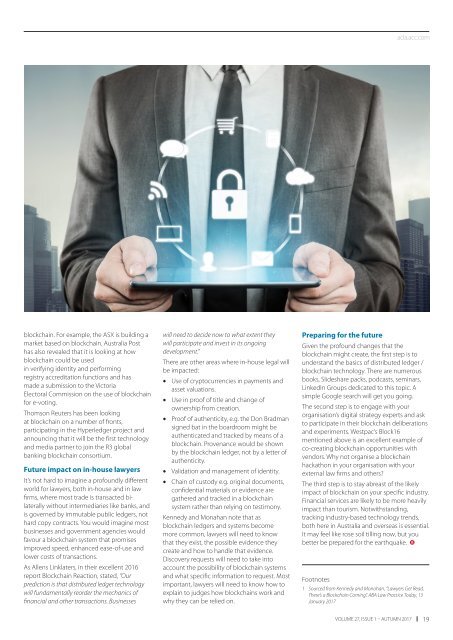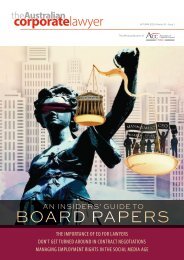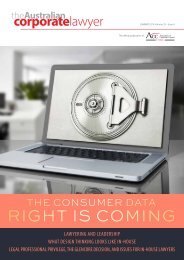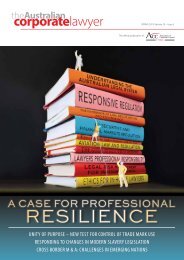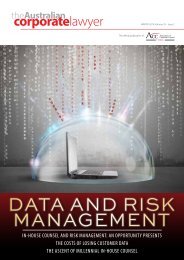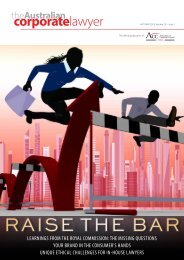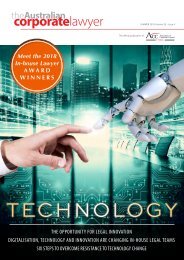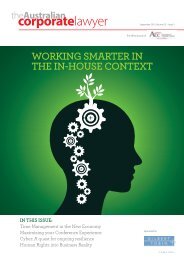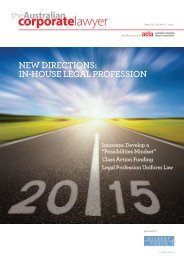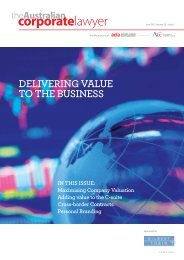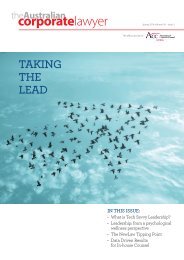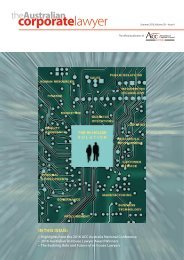Australian Corporate Lawyer - Autumn 2017
Australian Corporate Lawyer is the official publication of the Association of Corporate Counsel (ACC) Australia. The Autumn 2018 issue focuses on 'The Law and Technology' and features a range of articles covering topics including: the future of contracts and; the future of law firms as software companies..
Australian Corporate Lawyer is the official publication of the Association of Corporate Counsel (ACC) Australia. The Autumn 2018 issue focuses on 'The Law and Technology' and features a range of articles covering topics including: the future of contracts and; the future of law firms as software companies..
You also want an ePaper? Increase the reach of your titles
YUMPU automatically turns print PDFs into web optimized ePapers that Google loves.
acla.acc.com<br />
blockchain. For example, the ASX is building a<br />
market based on blockchain. Australia Post<br />
has also revealed that it is looking at how<br />
blockchain could be used<br />
in verifying identity and performing<br />
registry accreditation functions and has<br />
made a submission to the Victoria<br />
Electoral Commission on the use of blockchain<br />
for e-voting.<br />
Thomson Reuters has been looking<br />
at blockchain on a number of fronts,<br />
participating in the Hyperledger project and<br />
announcing that it will be the first technology<br />
and media partner to join the R3 global<br />
banking blockchain consortium.<br />
Future impact on in-house lawyers<br />
It’s not hard to imagine a profoundly different<br />
world for lawyers, both in-house and in law<br />
firms, where most trade is transacted bilaterally<br />
without intermediaries like banks, and<br />
is governed by immutable public ledgers, not<br />
hard copy contracts. You would imagine most<br />
businesses and government agencies would<br />
favour a blockchain system that promises<br />
improved speed, enhanced ease-of-use and<br />
lower costs of transactions.<br />
As Allens Linklaters, in their excellent 2016<br />
report Blockchain Reaction, stated, “Our<br />
prediction is that distributed ledger technology<br />
will fundamentally reorder the mechanics of<br />
financial and other transactions. Businesses<br />
will need to decide now to what extent they<br />
will participate and invest in its ongoing<br />
development.”<br />
There are other areas where in-house legal will<br />
be impacted:<br />
• Use of cryptocurrencies in payments and<br />
asset valuations.<br />
• Use in proof of title and change of<br />
ownership from creation.<br />
• Proof of authenticity, e.g. the Don Bradman<br />
signed bat in the boardroom might be<br />
authenticated and tracked by means of a<br />
blockchain. Provenance would be shown<br />
by the blockchain ledger, not by a letter of<br />
authenticity. <br />
• Validation and management of identity.<br />
• Chain of custody e.g. original documents,<br />
confidential materials or evidence are<br />
gathered and tracked in a blockchain<br />
system rather than relying on testimony.<br />
Kennedy and Monahan note that as<br />
blockchain ledgers and systems become<br />
more common, lawyers will need to know<br />
that they exist, the possible evidence they<br />
create and how to handle that evidence.<br />
Discovery requests will need to take into<br />
account the possibility of blockchain systems<br />
and what specific information to request. Most<br />
important, lawyers will need to know how to<br />
explain to judges how blockchains work and<br />
why they can be relied on.<br />
Preparing for the future<br />
Given the profound changes that the<br />
blockchain might create, the first step is to<br />
understand the basics of distributed ledger /<br />
blockchain technology. There are numerous<br />
books, Slideshare packs, podcasts, seminars,<br />
LinkedIn Groups dedicated to this topic. A<br />
simple Google search will get you going.<br />
The second step is to engage with your<br />
organisation’s digital strategy experts and ask<br />
to participate in their blockchain deliberations<br />
and experiments. Westpac’s Block16<br />
mentioned above is an excellent example of<br />
co-creating blockchain opportunities with<br />
vendors. Why not organise a blockchain<br />
hackathon in your organisation with your<br />
external law firms and others?<br />
The third step is to stay abreast of the likely<br />
impact of blockchain on your specific industry.<br />
Financial services are likely to be more heavily<br />
impact than tourism. Notwithstanding,<br />
tracking industry-based technology trends,<br />
both here in Australia and overseas is essential.<br />
It may feel like rose soil tilling now, but you<br />
better be prepared for the earthquake.<br />
Footnotes<br />
1 Sourced from Kennedy and Monohan, “<strong>Lawyer</strong>s Get Read,<br />
There’s a Blockchain Coming”, ABA Law Practice Today, 13<br />
January <strong>2017</strong><br />
VOLUME 27, ISSUE 1 – AUTUMN <strong>2017</strong><br />
19


